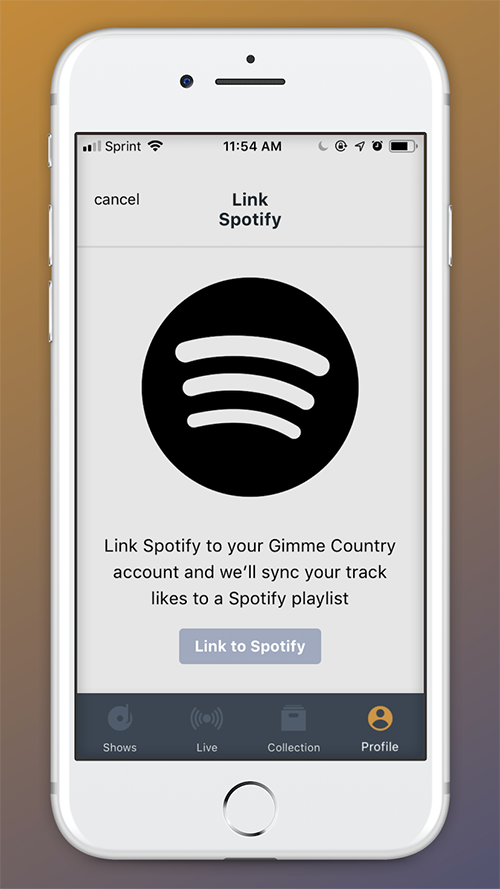Recently the popular music discovery platform Gimme Radio launched a new feature which allows its users to link their apps with Spotify, adding their favorite tracks to a playlist. Given that Spotify could, in many ways, be considered a competitor, why would Gimme radio do this? Here Tyler Lenane explains the rationell behind it.
_______________________________
Guest post by Tyler Lenane of Medium
Gimme Radio and Gimme Country fans discover so much new music in our apps. Now they’re making it easier for them to listen to new artists and music by linking their accounts with on-demand services like Spotify.
Last week, after we launched the ability for Gimme Radio and Gimme Country listeners to link their accounts with Spotify and save their favorite tracks to a “My Gimme Metal/Country Songs” playlist, people asked us why would we release a feature that empowers a competitor. I would have asked that same thing two years ago.

But the truth is most of our listeners are music fans that have, and will always have an on-demand subscription. They are also the fans that buy merch, attend live concerts, and buy physical music. Our listeners don’t just spend $9.99 a month. Gimme is not trying to win the on-demand space or even enter that race (you’d be crazy to do so). Instead, we focus on the fans that want more than just a digital stream.
For these fans, Gimme is truly complementary to the on-demand music services, and if the fans are already taking certain actions using Gimme and Spotify together, why not make it easier for them?
Discovering The Problem
When we set out to build Gimme Radio, one of the earliest problems we identified and set out to address was that music discovery was broken. We knew that many music fans wanted more than algorithmically generated recommendations and mood or activity-driven playlists. We knew they wanted to go deeper than “Best Of” created selections. We understood that certain fans wanted to dig deep — very deep — into an artist’s catalog and that these fans are forever searching for the lost hidden treasure or the next underground gem. And we knew first-hand that the large on-demand services, the online radio platforms, and satellite radio stations were not giving these fans the discovery they wanted.
At Gimme, we believe in the “magic of radio.” There is no better way to discover music than to have a trusted host acting as your guide, explaining why tracks are influential, making connections between tracks that algorithms won’t, sharing first-hand accounts of their experiences with the music, and giving you the history behind the track or album. When Pandora arrived in 2005, and allowed listeners to “seed” a station with artists, they were fixing a format that wasn’t broken. What is broken is the programming. Through the consolidation of terrestrial radio made possible by the 1996 Telecommunication Act, radio playlists became homogenized because individual stations and DJs had no control over what to play; for many music fans, radio became less adventurous and less interesting.

Tapping The Power Of Radio
Radio’s power to expose people to music is just as strong today as it was before consolidation, and it’s why we chose radio as the core of our community listening experiences. It’s also why we let the DJs play what they want within the genre. Our DJs are not bound by a programming board’s selected tracks like other services. Only on Gimme Radio will listeners hear a DJ play Thin Lizzy into Carcass and understand why that makes sense. And I challenge you to find places where you can hear George Jones played seamlessly into the new Sarah Shook & the Disarmers track. It’s why we encourage our DJs to play deep back catalog and the most unknown artists in the genre. It’s why we ask our DJs to talk about their personal connections with the songs. It’s why our program director is Brian Turner, who was the music/program director for WFMU, the gold standard in free-form FM, for over 20 years.
And our approach to discovery is working. We are finding new artists and tracks for the fans that they are not discovering anywhere else:
- In the U.S. on our metal station, Gimme Radio, between 24–49% of the tracks played have not been played on any other online radio service, satellite radio, or the radio products of the on-demand services. The 24–49% is not only comprised of newer artists that have yet to surface on these other platforms but older catalog content too. For example, the most listened to track from the Warner Music catalog is Montrose’s 1973 track, “Rock The Nation” — it’s about as far away from frontline catalog as you can possibly get. On Gimme Radio, there are labels over-indexing on market share solely because Gimme plays independent artists and music from the archives — and not just the handful of hits, but the deep tracks and B-Sides.
- Likewise, in the first 30 days Gimme Country was on the air, we played 908 artists (an amazing feat given the limited programming of FM, satellite and online radio) and ~31% of those artists were women. Compare this to the 11% played by terrestrial radio as reported in this recent Rolling Stone article. This is not just because we are finding new artists (which we are), but also because we are playing decades of legacy artists and material.
So today you can build Spotify playlists with metal and country tracks you didn’t know existed by artists unknown or long forgotten. Imagine the music we will all discover once we launch Gimme Jazz, Gimme Punk, Gimme Bluegrass, Gimme Soul…
Tyler Lenane is the CEO and a co-founder of Gimme Radio& Gimme Country.